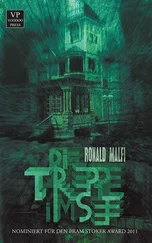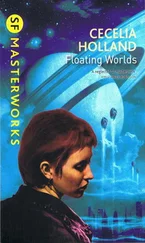CHAPTER FIFTEEN
Sometime during the night I was awakened by the sound of bare feet padding along the upstairs hallway. Dazed, I shook myself out of bed, just partially conscious of Jodie’s slumbering body beside mine, and stepped into the hallway, my eyes still fuzzy with sleep. I groped for the light switch, but it had apparently disappeared. Listening, I could hear the sound of the bare feet moving swiftly down the stairs.
For a long-drawn-out moment, I did not move. I couldn’t tell if I was fully awake, still dreaming, or caught in some abstract stasis of half sleep. My skin felt frozen while my insides were burning up as if with the onset of fever. Like a ghost, I crossed to the second-floor balcony and peered down into the foyer. At first I saw nothing. The longer I stared, I saw what appeared to be a small child standing motionless at the bottom of the staircase against one wall. Without pause, I turned and began moving down the stairs, one hand snaking along the banister in the darkness for support.
But when I reached the bottom of the stairs, the child had vanished. Moonlight pooled in through the large foyer windows and painted glowing blue panels on the carpet. I stood there, my body shivering yet covered in a tacky film of sweat, unable to decide what I should do next.
“Elijah . . . ?” It was only a whisper—not even a whisper, as my constricted throat was incapable of creating such a sound as forceful as a whisper at the moment—and the ghost boy did not acknowledge me.
I thought I heard something behind me. I turned. For a split second I forgot where I was. Oddly serene, I continued down the hallway searching for a boy I knew was not there. Everything appeared dramatically overemphasized—my own breathing, the creaks and pops in the floorboards, the sound of my bare feet transitioning from the sticky hardwood to the carpeted front hall. Beneath my feet the carpet felt overly fibrous, almost sharp. My footsteps shushed along.
There is clarity here, I thought, not certain as to what it actually meant.
The hallway emptied out into the living room.
I thought, Reality is a state of mind, just like dreaming, just like fiction. Everything is fiction. The trick is to grab on to something—to hold on to it for all you’re worth—until you’re able to regain some semblance of normalcy again.
I thought, Find an anchor.
This was where I stopped, right there in the center of the living room, cold and alone and not quite sure what the hell I was doing. I could see the bulbous piercing eye of the moon through one of the windows; I could feel the light from the streetlamps needling against my retinas. I thought I heard the basement door open at the other end of the house . . . thought I heard those same small, bare feet taking the steps quickly, two at a time, descending into that freezing, forgotten darkness . . .
But I did not move.
I was done chasing ghosts.
PART THREE:
THE OCEAN SERENE
CHAPTER SIXTEEN
Veronica Dentman lived in a nondescript Maryland hamlet that straddled some ambiguous demarcation between Cumberland and the Potomac Highlands of West Virginia, where the nightly television news filtered in from a station in Pittsburgh.
For much of my journey I followed a nameless and undisciplined ribbon of roadway that wound through dense, white-powdered forests and an undulating countryside. I’d spent the morning fueling my body with black coffee and smoked cigarette after cigarette in assembly-line fashion: paltry attempts to calm my jitterbugging nerves. Also, I’d awoken with a throbbing headache and weakness throughout my muscles, which was a sure sign I was coming down with something. Getting out into the wilderness and away from the confines of the house did me some good, but I could feel nervousness roiling around at the center of my guts like a parasite.
Beside me on the passenger seat was a single cardboard box of items I’d carefully selected from Elijah’s room to return to his mother. Tucked between both seats were several different road maps of western Maryland, a number of which did not even have Veronica’s small town of West Cumberland listed.
I anticipated the drive to take roughly an hour—not just from what Adam told me, but from the estimated distance between West Cumberland and Westlake on one of the maps—but near the end of my journey, I goofed up on some of the narrower, wooded back roads, confusing and twisting myself around like the dial on a compass, clocking unnecessary time to my travels. I’d heard stories of people even in this day and age getting lost in the woods, never to be seen alive again. Or seen at all, for that matter. Suffice it to say, I was more accustomed to traffic lights and road signs than long tracks of snow-packed dirt roads and evergreens for as far as it was possible to see.
After about twenty minutes of backtracking, I maneuvered the Honda through the empty, unkempt streets of a forgotten mountain community. It was not at all what I’d expected. While Westlake was tidy and warm and clean and, above all, a little too Norman Rockwell, this place looked like Westlake’s degenerate brother. The houses here—little more than double-wide trailers—were packed together like boxcars at a depot. They were small and pitiful, mismatched in color, with missing shutters and peeling siding. Some had old automobile tires nailed to the roof. Aluminum laundry carousels sprung up out of yards like miniature electrical towers and shone dully in the sun.
All the houses were fenced in, though not with the white picket style so common in Westlake: these yards were encased in rusted, chain-link prisons, vaguely reminiscent of the wire meshwork found in the windowpanes of mental institutions. Beside one front door stood the remnants of an immense television antenna, like some rib cage picked clean by vultures. Even the snow looked dirty.
After a few more minutes of hapless navigation, I located Veronica’s street (which was not an easy task since the street sign had been knocked at a right angle and jutted out into the roadway like the arm of a tollbooth). I hooked a right (giving the tollbooth arm a wide berth) and peered through the windshield to catch the first house number I could. This, too, was not an easy task: some of the homes had those wrought iron numbers tacked beside the front door and half shaded beneath a crumbling portico while others had numbers nailed to the wooden mailbox post, the only evidence of their existence in the numeral-shaped discoloration on the wood itself.
The street dead-ended at the base of a forested foothill. I hadn’t caught sight of Veronica’s address and wondered if perhaps Adam had gotten the wrong number. I dropped the car in reverse and retraced my route just to make sure, all too conscious of the kinks in the blinds and the sets of eyes watching me from darkened windows. Once again I came to the forested dead end and stopped the car. Either Adam had given me the wrong address, or a tornado had relocated Veronica’s house.
But wait. I leaned over the steering wheel and gazed out the windshield. The glass had fogged up in my exasperation, so I hit the defogger and waited a couple of seconds as the breath blossoms dematerialized on the glass. I’d missed it the first time around but could see it now: a rutted dirt path cleared of snow, running straight up the hillside through the pines.
I eased off the brake and coasted forward, the low-hanging branches of the pines thwapping against the hood of the car. The forestry was so impenetrable there was hardly any snow on the ground. I followed the road to the top of the hill where a shallow clearing opened up all around me.
At its center was a modular home, significantly larger than the double-wide trailers that preceded it along the avenue, but it did not look to be in much better shape. Like the rest of the residences of West Cumberland, Veronica’s home looked as if it had been dropped from some great height only to crash firmly down in this yard of dead and frozen weeds, hideously large novelty sunflowers, and dilapidated lawn furniture. There was an old tractor tire near the front of the house posing as a planter for a skeletal, flowerless shrub. A pyramid of wire mesh cages—crab pots or rabbit traps—stood against the left side of the house, stiffened hunks of colorless bait still harnessed within.
Читать дальше









